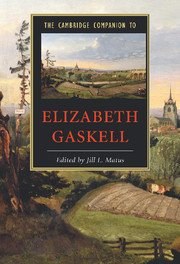Book contents
- Frontmatter
- 1 Introduction
- 2 The life and letters of E. C. Gaskell
- 3 Mary Barton and North and South
- 4 Cranford and Ruth
- 5 Elizabeth Gaskell’s The Life of Charlotte Brontë
- 6 Sylvia’s Lovers and other historical fiction
- 7 Cousin Phillis, Wives and Daughters, and modernity
- 8 Elizabeth Gaskell’s shorter pieces
- 9 Gaskell, gender, and the family
- 10 Elizabeth Gaskell and social transformation
- 11 Unitarian dissent
- 12 Gaskell then and now
- Guide to further reading
- Index
- Series List
3 - Mary Barton and North and South
Published online by Cambridge University Press: 28 May 2007
- Frontmatter
- 1 Introduction
- 2 The life and letters of E. C. Gaskell
- 3 Mary Barton and North and South
- 4 Cranford and Ruth
- 5 Elizabeth Gaskell’s The Life of Charlotte Brontë
- 6 Sylvia’s Lovers and other historical fiction
- 7 Cousin Phillis, Wives and Daughters, and modernity
- 8 Elizabeth Gaskell’s shorter pieces
- 9 Gaskell, gender, and the family
- 10 Elizabeth Gaskell and social transformation
- 11 Unitarian dissent
- 12 Gaskell then and now
- Guide to further reading
- Index
- Series List
Summary
Elizabeth Gaskell's two ''Manchester'' novels have often been paired in critical discussion in order to compare their representation of industrial life and their purchase on the relations of workers and masters, labor and capital. The process of industrialization in Britain had precipitated rapid shifts of population into the cities to seek work in the factories. Crowding, lack of sanitation, and other ills of urban expansion gave rise to concerns about ''the condition of England,'' as Thomas Carlyle famously put it. Fluctuations in the economy had in the 1830s and 1840s resulted in poverty and starvation among the laboring classes, leading to protests and demands for reform on the part of workers and fears of social unrest or, worse, revolution on the part of the middle and upper classes.
Until lately Gaskell's engagement with political economy, class conflict, and industrial conditions was rather narrowly construed, but recent feminist criticism has argued for wider definitions of the political and examined the novels as much for the political implications of gender and domestic life as for their factory, riot, and strike scenes. Taking my cue from a broadening sense of the way social conditions shape how subjects experience gender and class as aspects of identity, I propose in this chapter to look at what has been rather less discussed - Gaskell's representation of emotional and psychic states in the context of social change and the upheavals of modernity. Written with an eye on revolution abroad and Chartism at home, Mary Barton (1848) pleads with its middle-class readers for a sympathetic response to turbulent working-class feelings, even as it also represents the working classes as lacking in control over their emotions.
- Type
- Chapter
- Information
- The Cambridge Companion to Elizabeth Gaskell , pp. 27 - 45Publisher: Cambridge University PressPrint publication year: 2007
- 7
- Cited by

